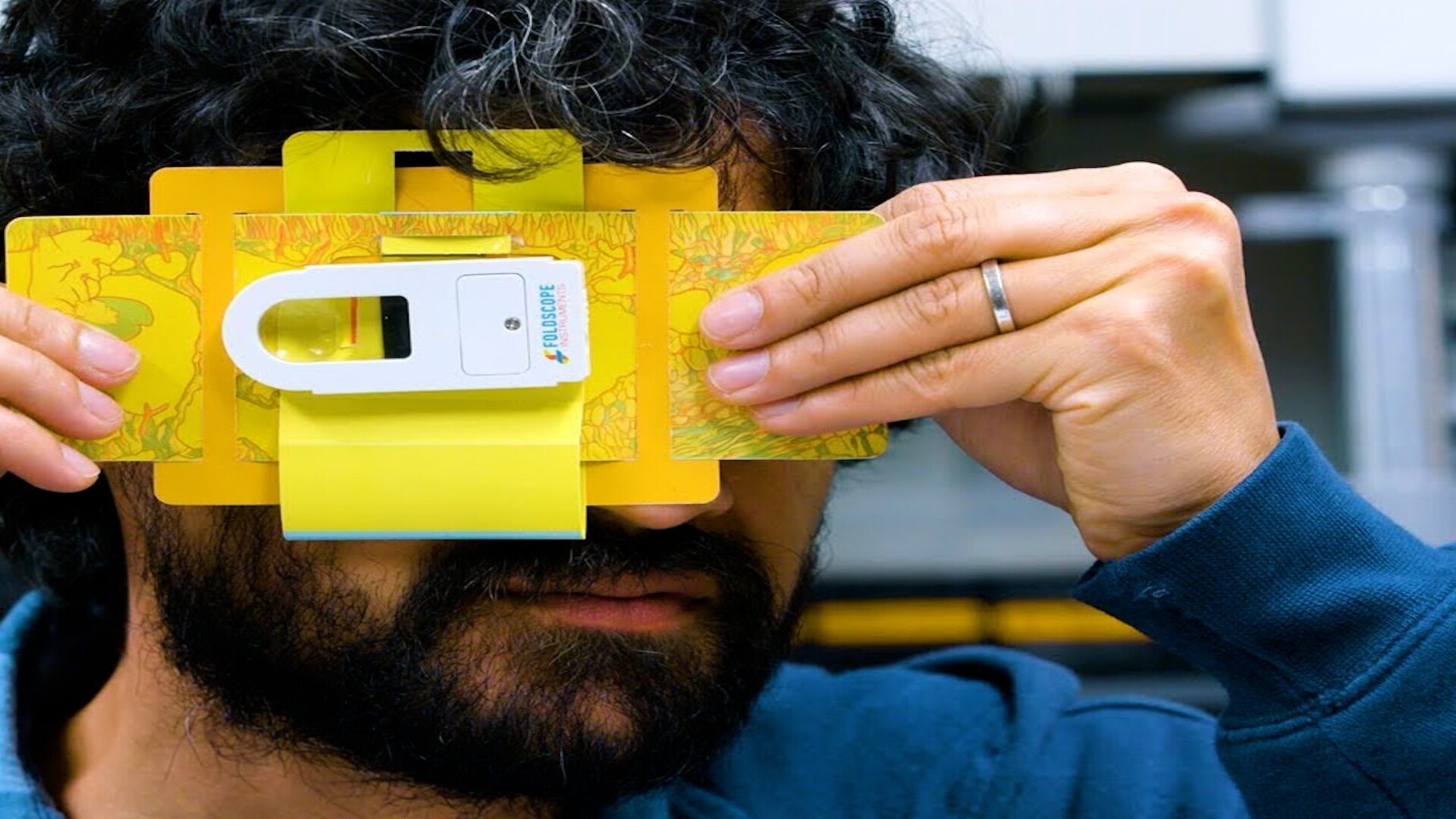
A Global Movement for Scientific Empowerment
In the world of science, a quiet crisis has emerged. Out of two billion children on the planet, nearly a billion live in poverty. This means that half the world’s talent has little or no access to basic scientific tools. This unequal access threatens not only education but also the global ability to solve major problems.
Manu Prakash, a bioengineering professor at Stanford University, grew up in India. He knows firsthand what it means to lack resources. As a student, he once had to draw a microscope during an exam without ever having seen or touched one. That moment planted the idea that if you do not have something, you can build it.
Years later, that simple principle shaped his biggest invention, a foldable microscope made from paper, called the Foldscope. Designed like origami, it costs less than a dollar to produce, weighs under ten grams, and fits in your pocket. Despite its simplicity, it can magnify the microscopic world with astonishing clarity.
The goal was not to create a fancy device but to place real scientific power in the hands of anyone, anywhere. And it worked. Today, over half a million Foldscopes are in use around the world. That means over half a million new pairs of eyes are exploring things once invisible, helping people notice the tiny organisms, cells, and structures that shape life.
A Tool for Everyone
What makes the Foldscope even more powerful is the global community it has inspired. Teachers, students, health workers, and everyday people now use it to understand their local environments, study bacteria, explore water samples, and even detect early signs of disease. People have adapted the Foldscope into new directions, creating a wave of inventions that Prakash never imagined.
But his mission does not stop with tools. Prakash believes that the world’s greatest scientific challenges, from climate change to biodiversity loss, cannot be solved inside a laboratory alone. They require passionate, informed citizens who are curious and equipped to observe the world around them. It is not only about knowledge but also about inspiring a deeper sense of ownership in science.
The Power of Community
To Prakash, this is a form of peaceful activism. By giving people the means to explore, observe, and question, he calls them into action. He believes that true change will come not from single breakthroughs, but from communities learning together, across borders and backgrounds.
The Foldscope is a symbol of this belief. Tools may change over time, but communities, when empowered, will stand strong. Through low cost, creative design, and global sharing, Manu Prakash is redefining how we think about science and who gets to do it.
Expanding Horizons
The impact of the Foldscope extends far beyond its physical form. It represents a shift in how science is perceived and practiced. It challenges the notion that scientific exploration is reserved for well-equipped laboratories and privileged individuals. Instead, it emphasizes inclusivity and accessibility, proving that innovation can emerge from the most unexpected places.
Prakash's vision aligns with a growing movement that seeks to democratize science. By making tools affordable and easy to use, he empowers individuals to contribute to scientific discovery regardless of their socioeconomic background. This approach not only fosters curiosity but also cultivates a sense of responsibility towards the environment and public health.
Inspiring Future Generations
The Foldscope has become a powerful educational tool, especially in regions where traditional microscopes are scarce. Educators have integrated it into curricula, allowing students to conduct experiments and analyze samples in real-time. This hands-on experience ignites a passion for science and encourages young minds to pursue careers in STEM fields.
Moreover, the Foldscope has sparked interest in citizen science initiatives. Individuals from diverse backgrounds are now contributing to research projects, collecting data, and sharing findings with the broader scientific community. This collaborative effort enhances the quality and scope of scientific studies, making them more representative of the global population.
A Legacy of Innovation
Manu Prakash’s journey highlights the importance of perseverance and creativity in addressing global challenges. His work serves as a reminder that solutions often lie in simplicity and resourcefulness. The Foldscope exemplifies how a small idea, driven by a deep understanding of human needs, can lead to transformative change.
As the world continues to grapple with complex issues, the principles behind the Foldscope offer a blueprint for future innovations. By prioritizing accessibility, affordability, and community engagement, we can ensure that science remains a universal language, capable of bridging gaps and fostering collaboration across cultures and continents.
Post a Comment